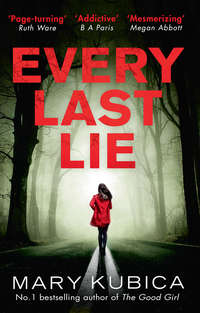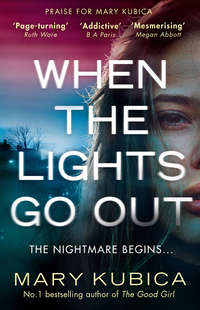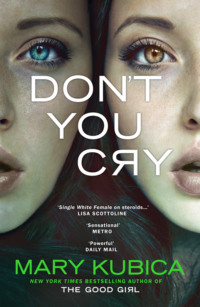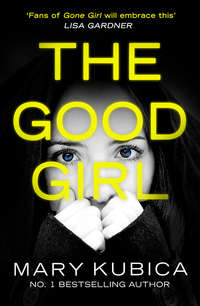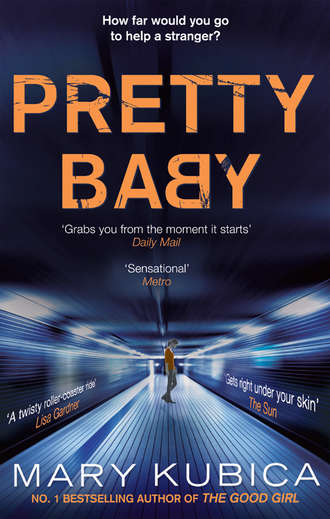
Полная версия
Pretty Baby
I stand there at the corner, watching until I can no longer see the army-green coat for all the people, until I can no longer hear the baby’s cries. A woman bumps into me and at the same time we say, “Excuse me.” I cross my arms, feeling naked in the brisk air—more fall-like than spring-like—and, turning onto Halstead, hurry to Stella’s. I’m wondering if the girl will show, wondering whether or not she knows where Stella’s is, whether or not she even heard me.
I scurry into the familiar diner and the hostess who greets me says, “No coat tonight? You’ll freeze to death,” as her russet eyes look me up and down—my hair in a frenzy, my clothing insufficient for the weather. I clutch an overpriced quilted handbag, paisley and plum, as confirmation, perhaps, that I am not a vagrant. I have a home. As if the burden of being homeless isn’t enough—the lack of food and shelter, of clean clothing—there’s the horrible stigma attached to homelessness, the disgrace of being thought of as lazy, dirty, a junkie.
“Table for one?” the hostess—a striking woman with snow-white skin and almond-shaped eyes—asks, and I say, “Table for two,” forever hopeful, and she escorts me to a round, corner booth that faces out onto Halstead. I order a coffee with cream and sugar and keep watch out the window, as people trek past, city slickers on their commutes home from work, twenty-year-olds en route to a cluster of college bars on Lincoln, their laughter penetrating the drafty windows of the diner. I watch the eclectic city life meander past the window. I love to people watch. Sleek men in charcoal suits and thousand-dollar shoes beside grunge band wannabes in thrift-store clothing beside mothers with posh jogging strollers and old men hailing cabs. But I hardly notice any of them tonight. All I am looking for is the girl. I think that I see her time and again. I’m sure I catch smidgens of her colorless hair, darker when it’s soiled and wet; of the nylon of her ineffectual coat; an untied shoelace. I mistake briefcases for her leather suitcase; imagine that the squeal of tires on wet pavement is the baby crying.
I receive a text from Jennifer that she’s arrived home from work and the girls are doing just fine. I scan my emails to waste time: most are work related, some junk mail. I check the weather: when will the rain end? No end in sight. The waitress, a fortysomething woman with the most luscious red hair and waxen, winter skin, offers to take my order but I say, “No thanks. I’ll wait until my group arrives,” and she smiles gently and says, “Of course.” And yet, for lack of anything better to do, I skim through the menu and decide on the French toast, but also decide that if my group never shows, I’ll settle for coffee. If the girl and her baby don’t arrive by—I check my watch—seven o’clock, I will pay for the coffee with an ample tip for the waitress’s time and retreat home to my chick flick and popcorn, and my overwhelming concern for the girl and her baby.
I people watch. I watch patrons come and go. I watch them eat, drooling over generous portions of German pancakes and hamburgers with waffle fries. I absolutely hate to dine alone. The waitress returns and refills my coffee and asks if I’d like to continue waiting and I say that I would.
And so I wait. I must check my watch every two and a half minutes. Six thirty-eight. Six-forty. Six forty-three.
And then she appears. The girl and her baby.
WILLOW
“Heidi was the first one in a long time who was nice to me.”
That’s what I tell her, the lady with the long silver hair, too long for someone her age. Old ladies are supposed to have short hair. Grandma hair. Short, wrapped tightly with hair curlers, the way Momma would do Mrs. Dahl’s hair when I was a girl, with the hot-pink curlers she’d plug in to warm, then sit for a half hour or more, painstakingly wrapping the dark gray, brittle hair around the curlers, then plaster it with spray. We’d wait, in that tiny bathroom of ours (my job was to hand Momma the pins), listening to Mrs. Dahl go on and on about how they’d artificially inseminate the cattle on their farm. I was eight years old and so I didn’t know what any of it meant, but I sounded out the words they spelled, words like s-e-m-e-n and v-u-l-v-a.
“Then why’d you do it?” she asks. The lady with the long silver hair, combed straight. And big teeth. Like a horse’s.
“I didn’t want to hurt her,” I say. “Or her family.”
She sighs, leery of me from the moment she walked into the cold room. She hung back, by the door, just watching me with gray eyes from behind a pair of rectangular glasses. She’s got thin skin, like tissue paper, used tissue paper, crinkles everywhere. Her name, she says, is Louise Flores. And then she spells it for me, F-l-o-r-e-s, as if it’s something I might need to know.
“We’ll start at the beginning,” she says, sitting on the other chair. She sets things on the table between us: a recorder, a stopwatch, a pad of paper, a felt tip pen. I don’t like her one bit.
“She wanted to buy me dinner,” I say. I’ve been told that being up-front will go a long way with the silver-haired lady. Louise Flores. That’s what they said, the others who were here: the man with the chin strap and mustache, the cutthroat lady dressed in head-to-toe black.
“Mrs. Wood wanted to buy you dinner?”
“Yes, ma’am,” I say. “Heidi.”
“Well, wasn’t that nice of her,” she says bitterly. Then writes something down in the pad of paper with the felt tip pen. “Ever hear the saying ‘Don’t bite the hand that feeds you’?”
When I stare off into space, ignoring her, she prods again, “Huh? Have you? Have you ever heard that saying: ‘Don’t bite the hand that feeds you’?” And she’s staring at me with her gray eyes, where there’s a reflection of the one fluorescent light off the rectangular glasses.
“No,” I lie, letting my hair fall in my face so I can’t see her. What you can’t see, can’t hurt you. That’s one I know. “Never.”
“I see we’re off to a great start here,” Louise Flores says with an ugly sneer, and presses a red button on the recorder. Then: “I don’t want to talk about Mrs. Wood though. Not yet. I want to go back to the beginning. Back to Omaha,” she adds, though I know good and well Omaha isn’t the beginning.
“What’ll happen to her?” I ask instead. I didn’t mean to hurt her, I tell myself, honest to God, I didn’t.
“To whom?” she asks, though she knows good and well who I mean.
“Mrs. Wood,” I say flatly.
She falls backward, sloping into the angles of the chair. “Do you really, truly care? Or is this just an effort to waste time?” She stares at me, hawkeyed, like Joseph used to do. “I’m in no rush here, you see,” she adds, crossing her arms across herself, across a crisp white blouse. “I’ve got all the time in the world,” and yet there’s a bite to her voice that suggests she does not.
“What’ll happen to her?” I ask again. “To Heidi?”
I imagine the warmth of that nice home, the feel of the soft bed, as the baby and I lay together under the brown blanket that felt just like the soft fur of a bunny rabbit. There were pictures on the walls, there in that home, family pictures, the three of them, pressed close together, smiling. Happy. It always felt warm in there, a different kind of warm, one you felt from the inside out, not the outside in. I hadn’t felt that way in a long time, not since Momma. Heidi was about the closest I’d gotten to Momma in eight whole years. She was kind.
The lady’s smirk is smug, her gray eyes lifeless, though her thin lips compress into a phony smile.
“As the saying goes, ‘No good deed goes unpunished,’” she says, and I imagine Mrs. Wood, in an orange jumpsuit like me, that kind smile washed off her face.
HEIDI
The girl stands there, on Halstead, before the door of the diner, peering through the glass. Not sure if she wants to come in. She’s come this far and yet she hasn’t quite made up her mind. I see through the glass that the baby is crying, still, though not disconsolate. More of a whimper. She has the baby swaddled in my raincoat, lying horizontally on her tummy as best she can manage with the leather suitcase in one hand. Good girl, I think. She was listening. She lays a hand on the door, and for an instant I’m no longer terrified that she won’t show, but suddenly terrified that she has. My heart scurries and a whole new quandary comes to mind: what will I say to her now that she’s here?
A young man in a hurry sweeps up from behind and nearly plows her over to get inside Stella’s. She staggers, retreating from the door, and I think that she’s changed her mind. This young man with his persnickety face, with too much pomade slicked in his hair, has made her change her mind. The man steps inside the warmth of the restaurant, holding the door open for the wavering girl. She eyes him, and then her eyes scan Halstead, trying to decide. Stay or go. Stay or go. After a moment of her hesitation, he briskly asks, which I hear vaguely over the clamor of a crowded restaurant, over dishes clinking and a multitude of voices, “You coming or not?” though the look on his face makes clear he might just let the door slam shut on her face and that of the baby.
I swallow hard and wait for her response. Stay or go. Stay or go.
She decides she’ll stay.
She steps inside the diner and the hostess with the russet eyes scans her up and down. The army-green coat and torn jeans, the musty smell that schlepps along with those living on the street, the baby, awed suddenly by the lights on the ceiling, the warmth of the diner, the noise that is distracting to me but somehow pacifying to her.
“Table for one?” the hostess asks the girl unenthusiastically, and I quickly stand from my corner booth and wave.
“She’s with me,” I mouth, and perhaps then the hostess makes the connection: my bare arms, a second warm, creamy coat swathing the baby. The hostess points in my direction. The girl makes her way through laminate tables, past obese bodies that spill out of banquet chairs, past waiters and waitresses carrying trays full of food.
“You came,” I say as she pauses before the corner booth. The baby turns, at the sound of my voice. It’s the first time I’ve seen the baby so close, under the canned lights that line the drop ceiling. The baby offers a toothless smile, lets out a dove-like coo.
“I found this,” the girl says, pulling out a familiar green card, which I recognize instantly as my library card, “in the pocket. Of your coat.”
“Oh,” I say, not bothering to hide my surprise. How silly of me to give away my coat without checking the pockets, and I remember jamming it inside en route from the public library to work the other day, a sci-fi thriller in my hands. She came to return my library card.
“Thank you,” I say. I take it from her outstretched hand, feeling the overwhelming need to touch that baby. To stroke her doughy cheek, or sweep the few strands of gentle snowy hair. “You’ll join me for dinner,” I say. I turn the library card over in my hands, and then stick it inside the quilted purse.
She doesn’t respond. She stands before the booth, her eyes—mistrusting, weary—looking down, away from me. “What difference does it make to you?” she asks, without looking at me. Her hands are dirty.
“I just want to help.”
She sets the suitcase on the ground, between her feet, and adjusts the floundering baby. The baby, as they tend to do without warning, is becoming agitated, possibly hungry, no longer interested in the recessed ceiling lights.
“It’s not what the world holds for you. It’s what you bring to it,” she nearly whispers, and I find myself staring, dumbly, until she says, “Anne of Green Gables.”
Anne of Green Gables. She’s quoting Anne of Green Gables. Of course, I think, imagining her and the baby on the floor of the library the other day, reading aloud from the L. M. Montgomery classic. Which makes me wonder what other classic children’s books she’s read. The Wind and the Willows? The Secret Garden?
“What’s your name?” I ask. She doesn’t tell me her name. Not at first anyway. “I’m Heidi,” I say, opting to go first. It seems only right. I, I remind myself, am the adult. “Heidi Wood. I have a daughter. Zoe. Who’s twelve.”
The mention of Zoe must help. She sits after a moment, readjusting the baby against her chest. She and the baby slide awkwardly into the corner booth and she pulls a dirty, formula-encrusted bottle from a coat pocket and fills it with ice water from the table. She sets the bottle into the baby’s mouth. The water is too cold, lacking in the nutrients of formula or breast milk. The baby quibbles for a moment, and then makes do. This is not the first time the baby has gotten by on water alone. Anything to fill the void in her tiny tummy.
“Willow.”
“That’s your name?” I ask and she hesitates, then nods. Willow.
Chris and I chose Zoe’s name because we liked it. The alternatives—Juliet, Sophia, Alexis—were all, we believed, to be used in time. For boys, we thought of Zach, to complement Zoe, and of course, Chris threw his own name into the hat. We talked, many times, about how we would trade in our vintage condo for a single family home farther north, Lakeview, or west, Roscoe Village, than our current home, where the mortgage would be slightly less, though the commutes to school and work exponentially longer. I found myself shopping for white, slatted bunk beds when we picked out Zoe’s crib; I foresaw rows of shabby chic comforters and dollhouse bookcases and an abundance of toys scattered across the floor. I thought of homeschooling as an alternative to the pricey private school that Zoe now attends, a much more practical alternative to the forty thousand dollars a year we would spend on tuition for all of our imaginary children.
The doctor used the word hysterectomy. I lay in bed at night when I should be asleep, considering that word, what it means. To the doctor, to Chris, it was a term, a medical procedure. To me it was carnage, plain and simple. The annihilation of Juliet and Zach, Sophia and Alexis. The end of that vision of shabby chic comforters and homeschooling.
But of course, by then Juliet was already gone, a simple D&C procedure that was anything but simple. There was no way to know whether or not she was a girl—that’s what the doctor said, what Chris restated time and again, that there was no way to know—and yet I knew, I knew with certainty it was Juliet who was discarded as medical waste, right along with my uterus, my cervix, parts of my vagina.
I found myself, still, stockpiling baby clothes that I found in boutiques in the city—lavender petti rompers and organic animal print bodysuits—hidden in bins that I purposely mislabeled Heidi: Work and stored in our bedroom closet, knowing full well Chris would never reconnoiter what he thought to be austere literacy statistics and college textbooks on ESL.
“It’s a beautiful name,” I say. “And your baby?”
“Ruby,” the girl says undecidedly.
“Lovely,” I say, and it is. “How old?”
There’s a pause, and then she says, as if not quite sure, “Four months.”
“Have you had a chance to look over the menu?” the redheaded waitress asks, appearing from out of nowhere, it seems. The girl, Willow, starts and looks to me to answer. The menu lies before her, untouched.
“I think we need some time,” I say, but suggest a mug of hot chocolate for Willow, who shivers on the other side of the vinyl booth from the cold. I secure my hands around my own mug, cooler now, but still retaining some heat of the coffee which the waitress now refills for a third time.
“Whipped cream?” the woman asks, and Willow looks to me for approval. Funny, I think, how in that split second she becomes a child, just at the very mention of whipped cream. She strikes me as an optical illusion, like the famous Rubin’s vase: depending on how one looks it at, one of two scenes appear, two profiles, placed face-to-face, or the vase which lies perched between them. They flip-flop before your eyes. Profiles, vase. Profiles, vase. Strong, independent young woman with a baby; helpless young girl with an affinity for hot chocolate and whipped cream.
“Of course,” I declare, perhaps too fervidly. Moments later the waitress returns with the heavenly drink, a warm white mug and saucer, with a plentiful mound of frothy snow on top, speckled with chocolate shavings. Willow reaches for a spoon and dips the tip into the whipped cream, and licks it off, savoring the taste, as if she hasn’t tasted hot chocolate in years.
How is it that someone like her comes to be living on the streets? To be living alone, no caregiver, no guardian. Of course asking the question seems entirely inappropriate, a sure way to send her running. I watch as she appraises the whipped cream, and then goes at it, full tilt, ladling spoonfuls into her mouth until it is gone, until it spills from the corners of her mouth and the baby watches her with covetous eyes, no longer enrapt with the ice-cold water, but with this bubbling white substance oozing from her mother’s mouth.
She raises the mug to her lips and drinks too fast, wincing at a burned tongue. With my spoon, I scoop an ice cube from a water glass and sink it into the hot chocolate. “There,” I say. “That will speed things along.” She hesitates, then tries again, and this time, she doesn’t burn her tongue.
There’s a bruise hidden above her left eye. An ochre color, as if it is healing. Her fingernails, as she grabs for the menu and decides what she’ll have to eat, are long and craggy, with an abundance of dirt wedged between the skin and nail. There are four earring holes placed in either ear, including the cartilage at the top of the ear that’s pierced with a black stud. Running the length of the earlobe are a set of silver angel’s wings, a gothic cross and ruby red lips, in that order. The red lips on the left lobe are missing. I picture them, lying on the filthy city sidewalk beneath the Fullerton Station, being squashed by passersby, or in the middle of the street, getting run over by cabs. Her bangs hang long, over her eyes. When she wants to look at me, she brushes them away, but then lets them enshroud her eyes once again, like a wedding veil. The skin, on her hands, her face, is chapped and red, creating fissures in the dermis, her hands riddled with dry blood. Her lips are cracked. The baby, too, Ruby, has hints of eczema, crusty red patches along her otherwise milky skin. I reach into my purse and produce a travel-size lotion and, sliding it across the table, say, “My hands get dry in the winter. The cold air. This helps.” And as she sets her hand on the lotion, I add, “For Ruby, too. Her cheeks,” and she shoves the bangs away and nods, and without hesitation, applies the cream to the baby’s cheeks. Ruby cringes at the coldness of the lotion, her noncommittal slate-blue eyes watching her mother curiously, with a bit of resentment mixed in.
“How old are you?” I ask, and I know that her immediate, premeditated answer is a lie.
“Eighteen,” she says, without looking at me. Every other question I’ve asked was met with hesitation. It’s the immediacy of her answer that makes me certain it’s a lie. That and the naïveté of her eyes when the optical illusion does an about-face, and she is again a helpless girl. A helpless girl like Zoe.
Children legally become adults at the age of eighteen. They become independent beings. Parents lose their rights over their children; they also lose financial responsibility. There are many things an eighteen-year-old can do legally that a seventeen-year-old cannot, such as living alone on the city streets. If Willow is only seventeen, or fifteen or sixteen for that matter, then certain questions are called to mind: where are her parents and why is she not living with them? Is she a runaway? The consequence of child abandonment? My eyes revert to the ochre bruise and I wonder if it’s a product of child abuse. If she was seventeen, she could be forced to return home, if such a home exists, or forced into the foster care system.
But I let these suspicions fall by the wayside and take the girl’s word at face value: she’s eighteen.
“There are shelters specifically for women and children.”
“I don’t do shelters.”
“I work with young women. Like yourself. Women from other countries. Refugees. I help them, sometimes, to get settled.”
The waitress returns to take our order. I order the French toast and Willow says she’ll have the same. I realize then that she would have had whatever I was having. She didn’t want to be presumptuous, to order a half-pound burger when I was having a salad, or breakfast when I was having dinner. The waitress removes the menus from our table and disappears behind a swinging aluminum door.
“There are some wonderful holistic shelters out there. They offer a safe haven, medical care, psychological care, education. There are caseworkers to help you get on your feet. Help you put together a resume, find childcare for Ruby. I can make some calls,” I offer, but I see that her eyes are cinched on an elderly man sitting at a booth alone, neatly slicing a deli sandwich in half.
“I don’t need any help,” she says, piqued. Then she’s silent.
“Okay,” I acquiesce, knowing if I continue down the same path, she’ll take the baby and the leather suitcase and leave. “Okay,” I repeat, quieter this time. A concession. I stop meddling and she will stay. So she stays and devours her dinner in near silence and I watch as the baby becomes slowly lethargic and drifts to sleep on the girl’s lap. I watch as the girl tears apart the French toast with the side of a fork, and drenches each and every piece in a pool of maple syrup before plunging it into her voracious mouth. I eat slowly, watching the syrup drip down her chin, watching as she wipes it away with the sleeve of the army-green coat.
When is the last time she’s had a square meal?
This is only one of the infinite questions I have for her. How old is she, really? Where is she from? How did she become homeless? How long has she been living alone on the streets? Where is Ruby’s father? How did she acquire the ochre bruise? How often does she visit the library? Does she always haunt the literature aisles, or just whatever suits her fancy on the given day? I nearly mention the librarian with the kind smile—a contrived comment for the purpose of small talk—but I stop myself in time. Of course the girl has no idea I saw her at the library, that I tarried in the neighboring aisle, spying as she read aloud from Anne of Green Gables.
And so we eat in silence. In place of small talk, there are the sounds that accompany eating: mastication and swallowing, more maple syrup spurting from the plastic bottle, a fork dropping to the floor. She reaches down and picks it up, and plunges it into the French toast like a torture victim who’s been denied food for days. Weeks. More.
When the meal is through she sets her hand on the suitcase and rises from the booth. “You’re leaving?” I ask. There’s a pang in my voice. I hear it. She hears it.
“Yes,” she says. Ruby wakes briefly from the movement and then returns to the Land of Nod.
“But wait,” I say, and there is that desperation I felt on the street: her, drifting away, and me, unable to stop her. I flounder for my purse and find a single twenty-dollar bill, not enough to cover the cost of dinner. I will need to wait for the waitress to bring the bill, will need to pay for the meal with a credit card. “Let me take you to the drugstore,” I beg. “We’ll buy you some things. Formula,” I say. “Diapers.” Hydrocortisone for those inflamed cheeks. Cereal bars for Willow. Diaper rash cream. Toothpaste. Toothbrush. Shampoo. Hair brush. Vitamins. Bottles of purified water. Gloves. An umbrella. And then it sounds harebrained, even in my own mind, for how could she tote all of those so-called necessities up and down the city streets.
She eyes the twenty in my open wallet and I yank it out, without a second thought, and extend it to her. “You’ll go to the drugstore,” I say. “Buy what you need. For yourself. For the baby.” She hesitates for a brief second, and then yanks the bill from my hand. She nods, which I take to mean yes and thank you.


